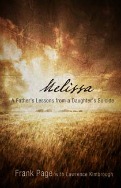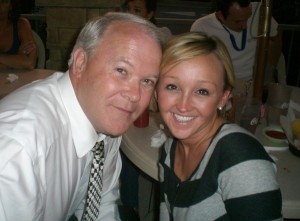Melissa: A Father’s Lessons from a Daughter’s Suicide. By Frank Page. Forward by Mike Huckabee.
At age 32, Melissa Page Strange took her own life. She left behind a husband, two parents, two sisters, and a son in the care of his adoptive family. Four years later her father, Frank Page, a longtime pastor and leader in the Southern Baptist Convention, wrote a book about how his daughter’s death changed his life, his family, his faith, and his understanding of suffering and tragedy in the lives of the people around him.
About the Book
Page dedicates his book to readers who are contemplating suicide, and he sets out a clear hope to avert tragedies similar to his own by sharing the devastating impact of Melissa’s death on those she left behind. He tells her story in the context of his own experience of raising a troubled daughter and the agony of watching her self-destruct despite his best efforts to support and help her.
At 224 pages, the book offers nine chapters, a short epilogue, and an appendix of suggested guidelines for pastors who minister to individuals struggling with suicidal thoughts or families who have lost a loved one to suicide. A unique feature of the book is the 3- to 4-page segment at the close of each chapter. Entitled, “A Letter to You, if you are contemplating suicide,” these short, personal messages are meant for individuals who probably lack the energy necessary to read the entire book but who need help. The segments pull out the essential content of the chapter and challenge readers to reconsider the validity of a suicide option, which Page describes as a permanent solution to a temporary problem.
Page shares his story in an intimate, first-person voice. Although the subject matter might be difficult to read and digest, the writing style is clear and easy to take in. The author repeatedly draws on his emotional experience as well as his rational and philosophical framework to describe events leading up to Melissa’s death and its aftermath. Although he suffered an intensely private and personal loss, he chose to write about it transparently with a desire to reach the hearts and minds of those contemplating suicide before it is too late. At times his anguish is so real and raw that readers may be tempted to question with him, “God, why did you allow this to happen? If You’re able to intervene in our world, if You hear our prayers, if You’re capable of changing the direction of people’s lives, why did You not change this? Why did you not change her?” (p. 44)
Not A Theological Treatise On Suicide
Despite Page’s training and experience as a pastor and previous president of the Southern Baptist Convention, Melissa is not essentially a religious book. Rather, it is a personal account written by a father who loved his daughter and was devastated by her loss. Yet, being a man of deep faith, Page inevitably comments on what he learned about God as he struggled to find meaning in a senseless death and put to the test his years of biblical faith.
As much as Melissa speaks to the disheartened person considering suicide, the book also speaks to families grieving in the terrible wake of a suicide as well as to those families still struggling with a loved one who is bent on self-destruction. Page carefully and convincingly lays blame for this suffering not on God but rather on our fallen world in which evil asserts itself through bad choices, sinful natures, and the relentless efforts of Satan. In his chapter on spiritual warfare, Page describes how the devil’s clever deceptions tease and drive people toward suicide and then burden their bereaved families with unrealistic guilt and regret. In a helpful seven-point list, Page details how to detect and disarm Satan’s lies, how to gather strength physically and spiritually, and how to appropriate God’s power to fight off the devil’s influence and move on into healthy grieving.
Drugs, Depression and Suicide
Although he admits he is not a physician, Page argues strongly against what he terms our “rampant drug culture” (p. 102), where prescription drugs are too easily prescribed, too easily obtained, and too often gateways to long-term dependency. He notes that drugs, depression, and suicide often travel together, and that other treatments for depression—such as changing one’s lifestyle and learning new coping skills—are overlooked in favor of quick-fix medications. He argues that excessive availability of drugs coupled with Melissa’s addictive temperament effectively put a loaded gun into her hand.
This is not to say that Page takes depression lightly or that antidepressants, properly administered and supervised, do not have their place. He speaks eloquently and compassionately about the burden of depression and the tunnel vision that leads to what he describes as a break with reality—surrendering to the notion that ending one’s life will provide the best remedy to a hopeless situation.
Hope’s Power to Heal
“We grieve. Oh, how we grieve. But not without hope.” (p. 139)
If there is a consistent theme throughout the book, that theme is hope.
Page offers it in many ways in every chapter. In his end-of-chapter letters to readers contemplating suicide, he persistently counters the enemy’s lies and asserts that life circumstances are never without hope. Because Melissa professed her love for God and belief in Jesus as her Savior, Page has confidence that she is presently with her Lord and free from torment, and that he will see her again. Indeed, he wrote his book from a firm position of hope, convinced that sharing the terrible details of his ordeal could help others find their way through the same grief and fear and frustration.
In his chapter on grief, Page writes, “How one grieves depends on what one believes” (p. 136). Because he believes in Christ’s resurrection power, Melissa’s father can celebrate the beauty of her life and the assurance that she continues to live. When asked if he has children, Page has learned to reply with all sincerity, “We have three grown daughters … one lives in South Carolina, one lives in Oklahoma, and … one lives in heaven (p. 147).”
To Order This Book
Melissa: A Father’s Lessons from a Daughter’s Suicide, by Frank Page. (2013). B&H Publishing Group: Nashville, TN. 224 pages.
ISBN 978-1-4336-7910-0
Purchase paperback or e-book through Amazon.com.
Watch Ed Stetzer’s Interview with Frank Page.
To learn more about Frank Page, visit FrankPage.org.






Leave a Reply